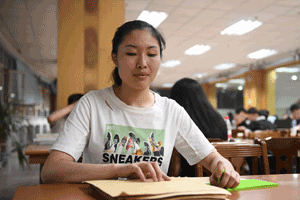HK should stick to executive-led system
Song Sio-chong points out that the SAR has never had separate legs of authority, as in the United States, or a supreme parliament, as in the United Kingdom
The question of whether the political structure of the Hong Kong Special Administrative Region is executive-led or features a form of separation of powers is often raised.
Laymen can easily mistake the existence of three (or more) branches of government with checks and balances as the practice of separation of powers.
But the fact is almost all nations have three (legislative, executive and judicial) branches of government at both the national and local levels. Can all of them be classified as having a political structure of "separation of powers"? The answer is a definite "no". Take the United Kingdom for example; its parliament enjoys supremacy over the other two branches of government. Meanwhile Hong Kong's political structure features an executive-led government, which is different from the practice of separation of powers.
What are the ingredients of separation of powers? For political scientists or constitutional scholars, the United States' system features a typical separation of powers. The separation doctrine dictates that the legislative, executive and judicial powers are purposely kept apart; they must have coequal status; the functions and powers of one branch cannot be mingled with those of the other branches; the members or officials of one branch cannot hold a concurrent post in another branch; and mutual checks and balances are obviously conducted. Most importantly, there are no supervisory powers above the said three branches of the government that have equal ranking. Only when all these requirements are met can a system be described as having a political structure of separation of powers, as the jargon truly implies.
Judging from these criteria, one may realize the UK does not practice that kind of system for its parliament is supreme over the executive and the judiciary and its cabinet members must be selected from members of either parliament or the House of Lords by convention. Before establishment of the Supreme Court early in this century the highest court was the House of Lords, or upper chamber of the legislature. Therefore, the British political structure is called "supremacy of parliament" rather than "separation of powers".
It can be easily observed that Hong Kong practices neither separation of power like the US nor parliament supremacy like the UK. For instance, the central government authorities are there to exercise a supervisory role as stipulated in various articles of the Basic Law, the relationship between the central government and the SAR is complicated and totally different from those between different branches of government in the US and UK.
As given in the Basic Law, the powers of the Chief Executive are much higher than those of the Legislative Council and judiciary - another arrangement different from the coequal status of the US president or the status of the UK prime minister, whose public policies can be vetoed by parliament. Hong Kong's political structure could only be described as "executive-led"; and any other term will be a misnomer.
A further question is why some people keep suggesting Hong Kong's executive-led system should be replaced by a form of separation of powers. The motive of such attempts may be difficult to reckon but it is easy to conclude that such a change in political structure would be detrimental to the "One Country, Two Systems" arrangement for several reasons.
Firstly, it would put in doubt China's basic policy regarding Hong Kong, which was elaborated by the Chinese central government in the Sino-British Joint Declaration. Before 1997, Hong Kong had maintained an executive-led government. In the said basic policy, it is promised that "the laws currently in force in Hong Kong will remain basically unchanged". If the executive-led political system of Hong Kong was to be converted into one of "separation of powers", this would be a breach on the part of China in the preservation of the laws, broadly speaking, previously in force in Hong Kong.
Secondly, the SAR would cease to be directly under the central government as stipulated in Article 12 of the Basic Law. As mentioned above, there are no supervisory powers above the three branches of government under a "separation of powers" system whereas such supervision is mandated by the Basic Law. A shift to that kind of political system would be in effect a blatant rejection of the central government's role under the Basic Law.
Thirdly, the legislative and judicial branches of the SAR government would demand more and higher powers than those given in the Basic Law. Since 1997, we have witnessed a broadening of their functions and powers, intruding on the domain of the Chief Executive and the executive branches of the government, and weakening the function and powers of the executive-led government.
And finally, friction and chaos would happen in the political system as upper structures cannot match the economic base of the SAR. Economic development would be hindered, public policies would be unduly derailed by judicial reviews and budgets would be delayed or even disrupted by filibusters or other irrational behaviors in LegCo. Maintaining the system of executive-led government is the only way to ensure the smooth operation of the SAR government.
- Dalian center gives hope to women, new life to embryos
- China holds inter-provincial disaster relief drill
- 20 years prove success of 'one country, two systems': official
- Backgrounder: What are supercomputers?
- China's two supercomputers still world's fastest as US squeezed out of 3rd place

























